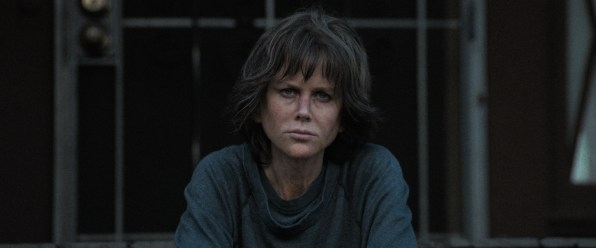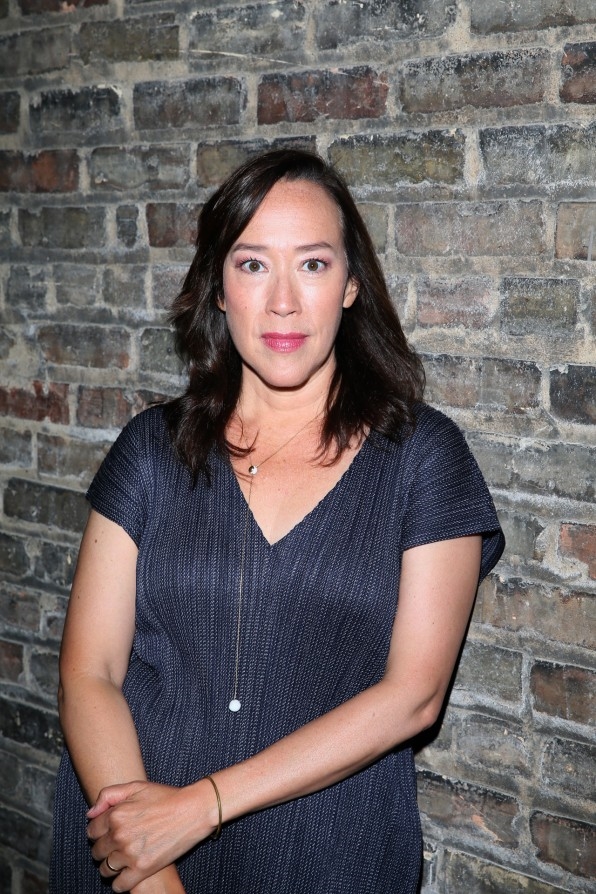A lot of the early media hits around Karyn Kusama’s crime epic, Destroyer, emphasized Nicole Kidman’s intense physical transformation. You may have seen Kidman in a pointy prosthetic nose before but you’ve never seen her like this! It’s true, too. Kidman’s Erin Bell looks like a sun-damaged corpse with a score to settle. Very un-Kidman like. However, focusing on the star’s looks betrays a fundamental truth about her astonishing work in the film.
You have never seen a character like this before, period.

[Photo: courtesy of Annapurna Pictures]
Kusama is a filmmaker who specializes in complicated female leads. (Think Michelle Rodriguez in Girlfight or Amanda Seyfried in Jennifer’s Body.) With the character Erin Bell, Kusama and Kidman have achieved the creation of someone unforgettable: an antiheroine you would never think to saddle with the patronizing designation of “badass.”
Written by Kusama’s frequent screenwriter collaborators Phil Hay and Matt Manfredi, Destroyer introduces Detective Bell in the present day, a broken-down husk of a human with haunted eyes. As this Bell pursues a resurfaced bank robber named Silas (Toby Kebbell), we flash back to a fresh-faced Kidman joining his gang as an undercover agent many years ago. The film then flits back and forth between the two time periods to give us a fuller sense of who Detective Bell was, who she is now, and what the hell exactly caused that transformation. Both versions of Bell are compromised and uncompromising. Together, they make up a unique individual whom viewers might love or hate but will almost certainly find compelling.
“I think I was attracted to that wounded cowboy quality Erin has,” Kusama says. “I think there’s something really interesting to me about how complicated and messy and difficult she is as a person. And to learn over the course of the movie that that’s also driven by hunger and greed and ambition is really interesting.”
In order to bring to life what makes Erin Bell such a remarkable character on the page, Kusama was going to need an actor capable of complex combinations of emotion. Gravitas mixed with vulnerability. Fear tinged by anger. And the perverse confidence that comes with having nothing left to lose. In Nicole Kidman, Kusama found a simpatico co-conspirator putting in the powerhouse performance of her career.
The pair talked a lot on set about Erin Bell’s physicality and the quality of her voice. The latter was easier to achieve; Kidman simply dropped her vocals a couple of octaves. Nailing Bell’s laborious way of carrying herself required a more unusual approach. Kusama would send the star all sorts of videos of animals like coyotes and hyenas. Some were injured in some way, others would be doing the injuring. The director would point out areas of interest in the videos, like “Watch how this alpha peels off one from the pack!” The director wanted no less than to put her star in an animalistic state, and Kidman was ready to absorb whatever Kusama threw her way. In fact, Kidman may have verged on absorbing it a little too much.
“It was a profound experience to work with an actor who is so deeply embodying a character,” Kusama says. “I’ve only recently gotten to know Nicole because that whole time, I was working with Erin Bell.”

[Photo: courtesy of Annapurna Pictures]
As game as Kidman was to play a spiritually bruised, morally ambiguous detective in perhaps the most ambitious, structurally pristine cops-and-robbers movie since Heat, not all viewers will be as eager to watch her. You may have noticed that there are not a ton of female antiheroes in pop culture. Mary-Louise Parker’s dope-dealing Nancy Botwin from Weeds comes to mind; as does Jodie Comer as Villanelle on BBC America’s Killing Eve and Amy Adams’s Camille Preaker from Sharp Objects. Maybe even Charlize Theron’s Mavis Gary in Young Adult, although she’s more of an emotional antihero. Whither the Antonia Soprano-type characters who are messy, law-flaunting female fuck-ups whom we still sort of root for?
“We obviously have circumstances in which a person’s transgressions, misbehaviors, most undignified moments can be celebrated culturally, and somehow that makes them real, that makes them authentic,” says Kusama, who is also married to Hay. “And I think for women, there is a bit of a double standard where we are meant to occupy one kind of space that’s culturally assigned and has very little to do with how women actually live in the world, and we are punished 100 times worse when we don’t occupy that space. As if we are somehow breaking some sort of cosmic contract with culture, which we’re not–we’re just living our lives!”
So, where does the blame go then for the lack of more female characters who are allowed to be complicated and flawed in the way men get to be? Is it the fault of gatekeepers who fear audiences won’t stand for seeing this sort of thing? Can actual, non-imaginary audiences handle a movie like Destroyer?
“It probably provokes a lot of feelings. I mean, I know it does–I’ve screened the movie,” Kusama says, laughing. “There’s men and women alike who are really freaked out and turned off by Erin Bell and by the movie. And to that, I say, ‘I don’t make movies for everyone.’ I make movies for myself in the hopes that that’s going to connect with people, and I do think part of what this character does is just take up a lot of space. She’s kind of a bull in a china shop. I just feel like I know those women and I’ve been that woman.”
When it comes down to whether audiences will be able to find that connection with a woman like Erin Bell once Destroyer is released on Christmas day–frankly, it’s not Kusama’s concern.
“For those viewers that aren’t able to arrive at any empathetic communion with this character, I can’t take care of that for them,” she says. “I can only do so much.”
(46)